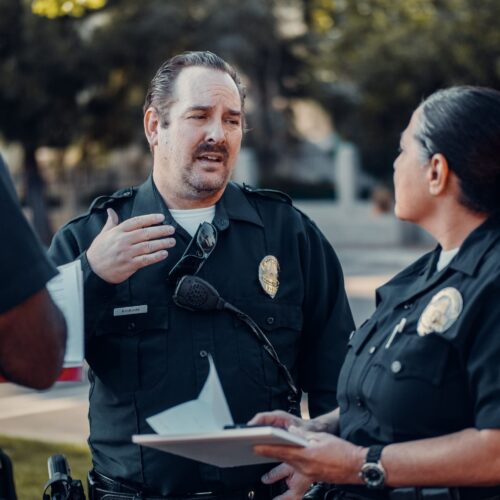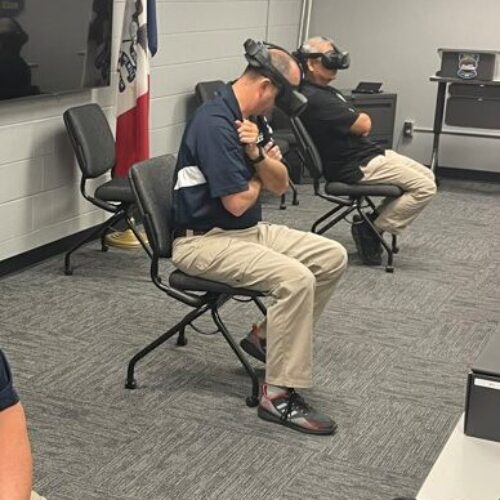
Two Counties Use Online Mental Health Court Curriculum to Work Toward Program Sustainability
By Ashleigh Fryer, CSG Justice Center Staff
 For many jurisdictions, sustaining a mental health court program can prove challenging both monetarily and in terms of staff capacity.
For many jurisdictions, sustaining a mental health court program can prove challenging both monetarily and in terms of staff capacity.
Grant funding often provides the seed money to plan or launch a mental health court. But obtaining additional funds to keep the program running once grants run out requires leveraging other funding streams and maintaining strong partnerships with stakeholders.
Similarly, maintaining a staff of committed, knowledgeable people who are well versed in the procedures of a mental health court requires intensive training using reliable tools. Reducing employee turnover, and providing comprehensive training to new staff members when turnover does occur, can also be difficult for programs to sustain.
Two counties—Putnam County, West Virginia, and Louisville-Jefferson Metro County, Kentucky—that received technical assistance from The Council of State Governments (CSG) Justice Center through the Justice and Mental Health Collaboration Program (JMHCP), used Developing a Mental Health Court: An Interdisciplinary Curriculum to sustain different aspects of their mental health courts. The online curriculum, which was developed by the CSG Justice Center, contains eight modules with information and tools to help jurisdictions think through the utility and implementation of a mental health court in their communities.
“The curriculum takes a huge amount of information and narrows it down to what you need to know,” said Alisha Lawson, Putnam County’s court coordinator. “It really shaped how our program has moved forward.”
Putnam County, West Virginia
When Putnam County, West Virginia, received a JMHCP grant in 2014, the grant funds were put to use in planning a program that would bring the county’s behavioral health and criminal justice systems together to improve outcomes for people with mental illnesses.
Lawson—then the state’s Veterans Treatment Court coordinator—and other stakeholders in the county recognized that adding a mental health component to Putnam’s pre-existing Veterans Treatment Court could benefit a large portion of the people with behavioral health needs whom they were seeing cycle in and out of their jail. As a step toward fostering collaboration between the behavioral health system and the Putnam County Jail, Lawson hosted monthly meetings, in
each of which a different Developing a Mental Health Court module was featured and discussed by the mental health court team—comprising Lawson, Judge Phillip M. Stowers, and case managers from a local behavioral health provider, Prestera Center—as well as members of law enforcement and housing and workforce service providers.
“With each module we’d address a new topic, but it would also reference and build upon the module prior to it, like stepping stones,” Lawson said. “That continuity worked well for us. And having open communication really helped engage everyone sitting at the table.”
For Lawson, using a tool that helped every team member and stakeholder to understand each aspect of the mental health court program was key to sustaining funding for the county’s program even after its planning grant ended. In June, the Putnam County Commission approved funding for the program, and in July, the first cohort of participants began.
“After having all the different agencies at the table talking to each other, they saw the need for the program,” Lawson said. “We had a lot people actively participating in the curriculum that wanted to see the program work and were willing to do whatever they could to make it a reality.”
Louisville-Jefferson Metro County, Kentucky
Louisville-Jefferson Metro County in Kentucky began its mental health court program in 2004 and has since received two JMHCP expansion grants—one in 2010 and another in 2014—that have allowed the county to create a new track targeting people who are seriously persistently mentally ill, chronically involved in the courts system, and have histories of homelessness and co-occurring substance use disorders.
After the county received its 2014 expansion grant, Jim Burch, director of criminal justice programs at Seven Counties Services, one of the largest behavioral health services providers in the Louisville region, began using Developing a Mental Health Court to train all the members of his staff who would be working with mental health court participants, including the two case managers he hired as part of the program’s expansion. For Burch, using the same tool to train old and new staff helps to keep everyone on the same page.
“We have staff who’ve been around for more than five years and some who’ve only been here a few months,” Burch said. “But the curriculum helps us talk about ways we can improve our practices and where we can do better as we move through our expansion phase.”
In addition to training his staff using the curriculum, Burch intends to train key stakeholders and the entire mental health court team—prosecutors, public defenders, and judges, among others—using the same methods. This, he hopes, will cement each person’s understanding of the roles involved in a mental health court.
“I’ve been with the county a long time, and I’ve been working with mental health courts for a long time, and I’ve seen how institutional memory can sometimes be a blessing or a burden,” Burch said. “The curriculum helped us rely on more than institutional memory. It gave me something interactive and up-to-date.”
********This application deadline has passed******** With support from the U.S. Department of Justice’s Office of…
Read MoreUnlike drug courts, which have been informed by national standards for 10 years, mental health courts (MHCs)…
Read More Building a Better Mental Health Court: New Hampshire Judicial Branch Establishes State Guidelines
Read More
Building a Better Mental Health Court: New Hampshire Judicial Branch Establishes State Guidelines
Read More
 Apply Now to Join a Community of Practice on Police-Mental Health Collaboration Staff Wellness
Apply Now to Join a Community of Practice on Police-Mental Health Collaboration Staff Wellness
With support from the U.S. Department of Justice’s Office of Justice Programs’…
Read More Empathetic Policing: Mason City Police Department Launches Virtual Reality Training Program to Help Officers Better Understand Behavioral Health Crises
Read More
Empathetic Policing: Mason City Police Department Launches Virtual Reality Training Program to Help Officers Better Understand Behavioral Health Crises
Read More
 Biden Signs Six-Bill Spending Package Funding Key Criminal Justice Programs
Biden Signs Six-Bill Spending Package Funding Key Criminal Justice Programs
On March 9, 2024, President Joe Biden signed a $460 billion spending…
Read More











